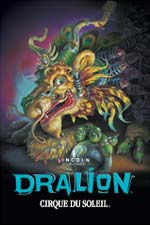 We received a lot of mail about the Archimedes Palimpsest item of last week. Hereís what I told those who inquired, and how you can get a closer look at this valuable artifact. Refer to the web-site shown in this illustration, and learn the fascinating history of the material. The fact that we can care so much about preserving knowledge that might otherwise be lost, should make us all very proud.
We received a lot of mail about the Archimedes Palimpsest item of last week. Hereís what I told those who inquired, and how you can get a closer look at this valuable artifact. Refer to the web-site shown in this illustration, and learn the fascinating history of the material. The fact that we can care so much about preserving knowledge that might otherwise be lost, should make us all very proud.
And speaking of wonders, I just saw the Cirque du Soleil production of their "Dralion" show. This sort of live, exuberant, thoroughly marvelous human endeavor is ample proof of just what an exciting species we are. Itís a celebration of the human spirit, a joyous affirmation of delight in skill and talent. I hope youíll be able to share my excitement over such an event. To add interest for me was the fact that it is rather dominated by Chinese artists, who bring us to recognize how much better things we have to become involved in, than war and strife between cultures, philosophies, and ideologies. Go see.
(Iím informed that due to a major fiber-optic cable being severed, our Chinese-version page has been somewhat delayed. Charles Chi and Matthew Hu, the two chaps who manage this for us, offer their apologies.)

Courtesy of The Rationalist Bulletin (Rationalist-owner@yahoogroups.com) comes this comforting news. In India, a "seer" named Pallavi, announced that she had an important message from the elephant god Ganesh to deliver. You may recall that figures of Ganesh in temples around the world a couple years ago were "drinking" offering of milk offered to him, a delusion that did not last long after the atmosphere of sour milk began to overpower worshipers. After speaking "in trance" to the traditional Hindu deity, Pallavi called the Airport Authority of India (AAI) and informed them that on February 10, exactly at 7:40 p.m., a passenger plane coming from Canada was going to crash over India. The plane, painted red and white (what else?) had the flight number I 298, she said. Airport officials lodged a formal complaint with the police against the caller. Quite sure about the veracity of her prediction, the "seer" offered herself to be arrested if it did not come true. Considering the possibility that sabotage might be involved, authorities checked the flight manifests, but there was no flight from Canada scheduled to fly in Indian air space at the given time. So as not to cause any unnecessary panic, they passed their information to senior officials in all possibly concerned airlines. When 7:40 p.m. passed and no air crash was reported, the "seer" confidently announced,"I meant Canadian time, of course." Well, 7:40 p.m. Canadian time passed, and still nothing happened. Never mind, says The Bulletin, to err is divine, Ganesh.
My comments on quack medicine have brought on challenges from some readers. One writes:
Surely you can acknowledge the (innumerable) shortcomings in our G.P. based system, without embracing the far-out and bizarre.
Yes. Medicine is not perfect. But it has not claimed to be perfect. It is at present further ahead than it has ever been. I'm alive because of it, being rescued from extinction on more than one occasion. Any system has "innumerable shortcomings." That's the nature of knowledge, science, and technology. No one should be surprised that medicine is still learning and discovering.
Is it too much to suggest that there is a balance (between nutrition and physical and psychological well-being), that is not properly addressed by current medical practices?
No, not at all. Though most MDs are aware of this, their patients demand magic, not the truth. Any proper doctor will adopt a holistic (not the New Age definition of this term) approach. As I see it, the PR agents of medical science have not made it clear that doctors are not gods, that their art is still developing, and that there are many ailments for which they can only offer relief, not a cure. Diabetes is a perfect example of this. But untreated diabetes leads to death; medical treatment provides a longer life, better life-style, and survival.
All it takes is a walk through your local pharmacy to see the ridiculous number of products which merely alleviate the symptoms, rather than address the cause, of an illness.
Yes, because thatís the only way available. How otherwise would you suggest that diabetes be treated? What's your suggestion on AIDS? What about high cholesterol levels? Angina? Failing kidneys? And remember that pharmacies sell materials that customers want, not only what they need. My Eckerd pharmacy has shelves full of homeopathic "remedies," all sorts of ginseng and ginko extracts, various totally untested herbs and magnetic bandages ó all forms of quackery that responsible MDs reject and condemn. There are countless illnesses that simply cannot, at this state of medical science, be "cured." But only a few decades ago, we would have included in that list diphtheria, tuberculosis, minor bacterial infections, rheumatic fever, syphilis and other venereal diseases, and various strep strains. These things once killed victims, almost without exception; now, they are easily treated. Medical science has moved forward dramatically.
As for how to "address the cause of an illness," there is nothing that will prevent hereditary problems, casual infections (viral and bacterial), or many neurological malfunctions. Obesity promotes cardiac and diabetic problems, respiratory ailments can be brought on by poor environmental controls, smoking is a deadly, stupid choice that kills; these are factors that ARE being addressed, forcefully and assiduously by science. And they are each a "cause of illness." Frankly, I don't see that the readers point is valid, at least not to the extent that is suggested.
The geometrical problem I posed last week would have been better stated as, "You have a square," rather than "Draw a square." I meant for you to be limited to the use of a straightedge just for the required construction of the triangle. And did we get answers! About two-thirds were correct, others tried to use the straightedge in ways that are just not permitted. I didnít state that the edge of the square had to be the base of the triangle, which most who missed the solution, assumed, and tried to bisect the upper side of the square. The simple, direct, solution is to draw one diagonal of your square, and you have not only one, but two, isosceles triangles which are each half the area of the square!
But here comes the surprise ó to me, at least. A reader Iíve been unable to track down, has provided this solution ó which I would have said is not possible, because I canít see how one can bisect a line using only a straightedge. Of course we have a square already, so that helps. This just may be legit, and Iíll give you his/her solution for perusal. On first tests, it seems to work, but I canít say just how it works ó because I donít know.... After supplying the simple solution given above, my reader writes:
The more interesting problem, and the one I think you mean to be solved, is the one where the base of the triangle shares an edge with the square and the apex is at the midpoint of the opposite edge. To get this, take the bottom horizontal edge of the square and extend it left and right of the square. Also take the two vertical edges of the square and extend them upwards (the goal is to create a rectangle out of these vertical extensions having the same width as the square). To construct the rectangle, take some point P along the left extension of the base and draw a line from that point going through the top left corner of the square. Extend this until it intersects with the vertical line on the right, call this point A. Do the same with an arbitrary point Q on the right baseline extension of the square. Draw a line from that point through the top right corner of the square until it intersects the left vertical, call this point B. Now, draw a line from P going through B and intersect this with the right vertical at X. Then, draw a line from Q going through A and intersect it with the left vertical at Y. Connecting X and Y forms a perpendicular to the vertical lines, giving us a rectangle. Find the centers of the rectangle and square by connecting diagonals. Connecting these centers will bisect the top edge of the square and now we can form our isosceles triangle.
As for the Impossible Staircase of Jerry Andrus you saw last week, I offer the original photo, plus these two additional illustrations in explanation. Each strips away a bit more of the misleading information. I hope this makes it clearer. We are preparing a model of this structure, and soon youíll see a video here of just how confounding it is to see it in use.
Next week, the incredible tale of a retired Florida psychiatrist-turned-parapsychologist who has a "find" in the psychic world, a man who does simple magic tricks right straight out of the catalog, and fools this "expert." Weíll discuss a 24-page article that the parapsychologist wrote extolling this magician simply because he doesnít know that he can be fooled by kidís tricks, in "Alternate Perceptions" Magazine, weíll describe the tricks and even give you the catalog numbers so you can buy them and become a mental giant!

